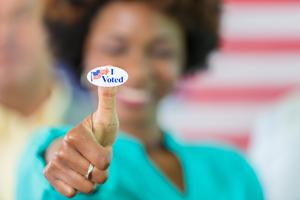She Votes. She Leads.
New Poll: What Mattered to Women in the 2018 Midterms

A new post-election poll confirms many women voters strongly dislike President Trump and are troubled by his tone and use of offensive language, but they also say he wasn’t the only factor driving their votes this fall.
President Trump has a steep hill to climb if he is to win over women voters in 2020. The poll shows 60 percent of women voters – including nearly two-thirds of Independent women – view the president unfavorably. Republican women too have lukewarm views toward him personally – with 37 percent who say they don’t like him but agree with him on issues and only 55 percent who say that they both agree with him on most issues and also find him likable.
The survey, commissioned by the Women & Politics Institute at American University’s School of Public Affairs and conducted by the Benenson Strategy Group (BSG), consisted of 1,200 online interviews with 2018 midterm voters – 799 of whom were women – and was taken between November 15-20, 2018.
Results suggest that President Trump was a major factor in how women cast their votes, but not the only one. Two-thirds of female voters said that Trump influenced their voting decision in November but when asked what mattered most to them when voting for Congress, two in three women (65%) said that the merits of the individual candidate was more important to them than simply electing someone to be a check on Trump. This number was even higher among Independent women (75%), who both parties will be heavily targeting in 2020.
When looking at individual issues, Republican women cited immigration and the economy as their top two motivators, more important to them than showing support for President Trump. While among Democratic women, health care and opposition to President Trump were the most significant motivators.
“Though Trump looms large in women’s minds, if either party thinks it can run in 2020 on Trump and Trump alone, its candidates will have a hard time connecting beyond their bases – and even there, women have other priorities and values that they want addressed,” said BSG Senior Vice President Katie Connolly, who led the research. “The data suggests that women were making their voting decisions based as much on a candidate’s approach to pocket book issues – such as the costs of healthcare and prescription drugs – as on their views on Trump.”
President Trump’s rhetoric – particularly toward women – appears to be a major point of concern among women voters. More than three-quarters reported being troubled by either his tone or policies, and half are troubled by both. Even among Republican women, a little more than half (51%) are bothered by Trump’s tone, 48 percent of them are concerned about the way he speaks about women, and four in ten are concerned about his tone toward immigrants. Among white suburban women, a swing group that was key to numerous Democratic House victories this fall, 71 percent were concerned with how he speaks about women and 67 percent about immigrants.
The poll also revealed some red flags for a male-dominated Congress. Female voters overwhelmingly believe that women, more than their male counterparts, possess the leadership qualities that Washington sorely needs. This includes key qualities such as “getting things done,” “solving problems,” “building a better future,” and “fighting for ordinary Americans.”
“The newly elected women from across the country have a real opportunity to use their collaborative, problem-solving leadership skills to make a difference and break through Washington’s gridlock,” said Betsy Fischer Martin, the Executive Director of the Women & Politics Institute, who commissioned the study. "It’s important that they know their female constituents will be supportive of their efforts at bipartisanship."
Solid majorities of women are optimistic about the record number of women elected to office: 72 percent of women voters find the increase in female representation “exciting” and 66 percent says it’s a “good thing.” Looking ahead to the next Congress, they anticipate that women politicians will make more progress than their male counterparts on the issues they care about most, such as health care, prescription drug costs, protecting Social Security and Medicare, and promoting civility in our politics.
In addition, women view the success of these female political leaders through a personal lens: 85 percent agree with the notion that, when women succeed, it opens doors for other women.
The full report on the 2018 post-election poll can be accessed here.

